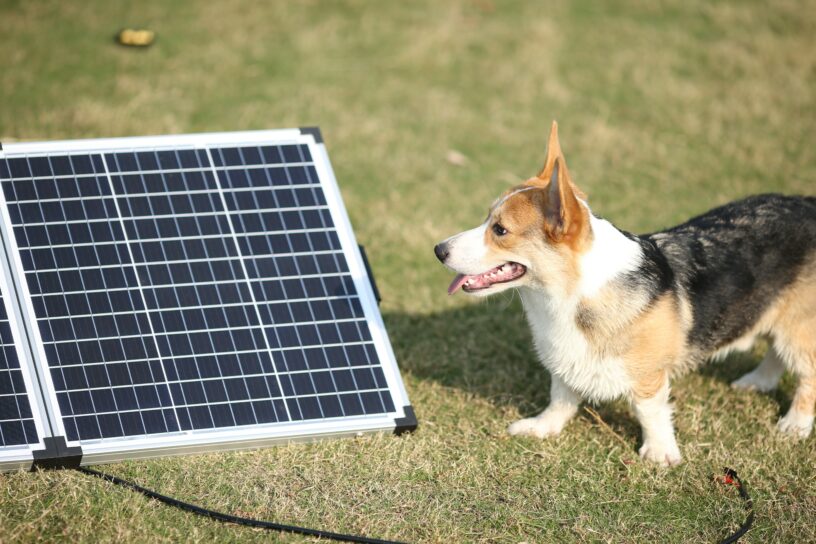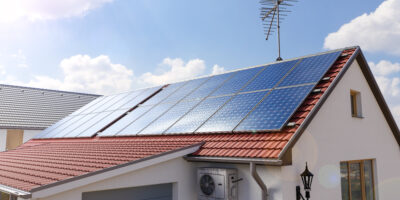Powering Your Home with the Sun: An Introduction to Solar Energy Products
If you’re looking for ways to reduce your energy bills and carbon footprint, solar energy might be just what you need. Solar power is a clean and renewable energy source that uses the sun’s rays to generate electricity. Installing solar panels or other solar products in your home can harness this free and abundant resource to power your appliances, lights, and more.
The Benefits of Solar Energy
There are several benefits to using solar energy in your home. First and foremost, solar power is renewable, meaning it won’t run out like fossil fuels will eventually. This makes it a much more sustainable energy source in the long term.
Additionally, using solar power can help reduce your dependence on non-renewable sources like coal and oil. Another major benefit of solar energy is that it can save you money on utility bills.
While the upfront costs of installing a solar system can be high, over time, you’ll recoup those costs by generating your electricity rather than purchasing it from the grid. Plus, many states offer incentives for homeowners who install solar panels or other types of solar products.
Overview of Solar Energy Products
Various products allow homeowners to take advantage of the sun’s power. Some popular options include:
- Solar panels: These are the most well-known type of home solar product. They are typically installed on rooftops or in yards and work by converting sunlight into electricity.
- Solar water heaters: These systems use the sun’s heat to warm up water in showers, washing machines, and other household appliances.
- Solar air conditioners: Instead of relying on electricity to power your AC unit, you can install a solar-powered air conditioner that uses the sun’s energy to cool your home.
- Solar lights: These outdoor lights use photovoltaic (PV) cells to convert sunlight into electricity. They’re an excellent option for lighting up pathways or gardens at night.
- Battery storage systems allow homeowners to store excess energy generated by their solar panels or other solar products for later use. This is especially useful when the sun isn’t shining, like at night or on cloudy days.
Depending on your needs and budget, any of these options could be a great way to start incorporating solar energy into your home. In the following sections, we’ll examine these products and explore how they work and their benefits.
The Magic of Solar Panels
Solar panels are an incredible invention that has revolutionized how we think about energy production. They work by converting sunlight into electricity through a process called photovoltaics. This process occurs when photons from the sun’s rays strike the panels, creating an electrical current that can be used to power your home.
Two main types of solar panels are available for home use: monocrystalline and polycrystalline. Monocrystalline panels are made from a single silicon crystal and are often considered more efficient than their polycrystalline counterparts, made from multiple crystals.
However, monocrystalline panels can also be more expensive. When choosing a solar panel system, there are several factors to consider.
First and foremost is system size – you’ll need to determine how much energy your household uses on average to select a system that will adequately meet your needs. Additionally, you’ll want to consider factors such as panel efficiency, durability, and warranty coverage.
It’s also essential to consider whether you want a grid-tied or off-grid solar panel system. Grid-tied systems allow you to remain connected to the traditional power grid while still using solar energy, which can be beneficial if your area experiences frequent power outages or if you don’t want to rely on solar energy alone fully.
Off-grid systems operate independently of the traditional power grid and usually require battery storage to store excess energy for later use. It’s worth considering whether you want a ground-mounted or roof-mounted system.
Ground-mounted systems require additional space but can generate more electricity due to their ability to capture sunlight from multiple angles throughout the day. Roof-mounted systems take up less space but may need to be more efficient depending on your roof’s orientation and shading.
Overall, there are many factors to consider when selecting a solar panel system for your home. However, the benefits of solar energy – including lower electricity bills and reduced environmental impact – make it an investment worth considering.
Solar Water Heaters: Hot Water for Your Home
Solar water heaters are an excellent way to save money on utility bills while benefiting the environment. A solar water heating system is a device that uses sunlight to heat the water in your home.
It is more efficient than traditional water heaters because it uses renewable energy to heat water. Additionally, it can save you up to 50% on your energy bills and reduce your carbon footprint.
Benefits of Using a Solar Water Heater
There are many benefits of using a solar water heater in your home. First, it is an environmentally friendly option because it produces no harmful emissions or CO2.
Second, it is much cheaper than traditional methods because you can avoid paying for electricity or gas. Third, it does not require as much maintenance as traditional systems because fewer moving parts and components can break down over time.
Types of Solar Water Heaters Available
Two main solar water heaters are available: active and passive systems. Active systems use pumps and controllers to circulate the hot water from the storage tank to the house, while passive systems do not require additional equipment and rely on gravity to move the hot water. Passive systems are usually less expensive than active ones but may be less efficient overall due to limitations with gravity-assisted flow rates.
Active systems are more expensive upfront but offer greater control over temperature regulation and hot-water delivery. Both types work well in sunny climates where there is ample sunlight year-round.
How To Choose The Right Size And Type For Your Home
When choosing a solar water heater for your home, you must consider several factors: – Climate: Determine how much sunlight your area receives throughout the year. – Household size: Consider how many people live in your home and how much hot water you use daily.
– Space: Determine how much roof space is available to install solar panels. – Budget: Determine your budget and evaluate the cost-effectiveness of different solar water heating systems.
Once you have determined these factors, you can choose the right type and size of solar water heater for your home. It is important to have a professional installer perform a site evaluation to determine the best size and location for optimal performance.
A solar water heater offers many benefits for homeowners who want to reduce their energy costs and help protect the environment. By understanding the types of systems available and how to choose the right one for your home, you can make an informed decision about whether or not this type of system is right for you.
Solar Air Conditioners: Keeping Your Cool Without Breaking the Bank
Traditional air conditioners can be expensive to operate and maintain when cooling your home in the summer. Enter solar air conditioners – a more cost-effective and eco-friendly option for homeowners looking to stay cool without breaking the bank. But how exactly do they work?
How does a solar air conditioner work?
Solar air conditioners use photovoltaic (PV) technology – the same technology used in solar panels – to generate electricity that powers the unit’s compressor and fan. The PV panels are typically mounted on the roof or an outdoor wall, where they can harness sunlight and convert it into usable energy.
The energy is stored in batteries or fed directly into the house’s electrical grid. In some cases, excess energy generated by the PV panels during the day can be sold back to utility companies.
Advantages and disadvantages compared to traditional air conditioners
The biggest advantage of solar air conditioners is their cost-effectiveness over time. While they may have a higher upfront cost than traditional AC units, their lower operating costs can balance or exceed those initial costs over time.
Additionally, relying on solar power means homeowners are less vulnerable to fluctuations in electricity prices and outages caused by power grid failures. However, there are some downsides to consider as well.
Solar AC units may not be as powerful as traditional units, so they may not be suitable for larger homes or areas with very hot climates. And while they don’t generate greenhouse gas emissions like traditional ACs, they still require rare earth minerals to manufacture, which can have environmental impacts.
Factors to consider when choosing a solar air conditioning system
When choosing a solar-powered AC system for your home, there are several factors you’ll need to consider:
– Size: Choose an appropriate unit for your home’s cooling needs.
– Efficiency: Look for units with high energy efficiency ratings to ensure you get the most out of your solar power system. – Installation: Consider the installation process and whether you’ll need professional help to get your system up and running.
– Cost: Factor in the upfront costs of purchasing and installing a solar AC unit and ongoing maintenance and repair costs. – Climate: Consider your local climate and whether a solar AC unit can handle the demands of hot, humid summers.
Overall, if you’re looking for an eco-friendly and cost-effective way to keep your home cool during the summer, a solar air conditioner could be just what you need. So why not consider making the switch today?
Solar Lights: Brighten Up Your Home with Renewable Energy
More homeowners opt for solar-powered lighting solutions as the world approaches sustainable living. Solar lights offer a cost-effective and eco-friendly alternative to traditional lighting options.
They can be used for outdoor, garden décor, and indoor lighting. This section will discuss the different types of solar lights available for home use, their benefits, and how to choose the right type and placement for your needs.
Different Types of Solar Lights Available
There are a variety of solar lights that you can choose from depending on your specific needs. Here are some of the most popular types:
– Solar Garden Lights: These are small, decorative lights that can be placed along garden paths or used as accent lighting in flower beds. – Solar Spotlights: These lights emit a focused beam of light and can be used to spotlight trees or architectural features in your yard.
– Solar Floodlights: These lights emit a wider beam of light and are ideal for illuminating large areas like driveways or patios. – Solar String Lights: These decorative lights come in various shapes and sizes, including festive holiday lights that you can hang around your patio or backyard.
Benefits of Using Solar Lights Instead of Traditional Lighting Options
Solar-powered lighting is not only eco-friendly but also offers several other benefits. – Cost-effective: Since solar-powered lights do not require electricity from the grid, you save money on energy bills over time.
– Easy installation: Most solar-powered lights come with an easy-to-install design allowing you to set them up anywhere without additional wiring. – Low maintenance: Once installed, these lamps only require a little upkeep since they have no moving parts or mechanical components that need servicing.
How to Choose the Right Type and Placement for Your Needs
When choosing solar lights for your home, consider the following factors: – Lighting needs: Determine where you need the lighting and what type of light it should produce to meet your needs.
– Size: Choose the right size for the appropriate lighting fixture for your space. – Quality: Invest in high-quality solar-powered lights to ensure they last longer and perform better over time.
Final Thoughts Solar-powered lights are a great way to brighten your home while contributing to a sustainable future.
With various options available, you can choose a design that complements your style and meets your needs. By selecting high-quality solar light fixtures and ensuring proper placement, you can enjoy their benefits for years.
Battery Storage Systems
Energy Storage – The Next Step for Solar Homes
As solar panels continue improving in efficiency and affordability, homeowners are looking for ways to reduce their dependence on the grid further. One promising solution is battery storage systems. These systems store excess energy produced by your solar panels during the day, which can then be used at night or during periods of high demand.
How Do Battery Storage Systems Work?
Battery storage systems typically consist of a battery pack, an inverter, and a monitoring system. Your solar panels charge the battery pack during the day. When energy demand exceeds what your solar panels can provide, such as at night or on cloudy days, the inverter converts the stored DC energy into AC power that can be used to power your home.
Types and Sizes of Battery Storage Systems
Several types and sizes of battery storage systems are available for residential use. Lithium-ion batteries are currently the most popular type due to their high energy density and long lifespan.
Other options include lead-acid batteries and flow batteries. The size of your battery storage system will depend on your household’s energy needs.
A smaller system might consist of just one or two batteries with a capacity of around 5-10 kilowatt-hours (kWh). Larger homes with higher energy demands may require a larger system with multiple batteries totaling 20-30 kWh or more.
The Cost of Battery Storage Systems
Battery storage systems can be expensive upfront but may pay off over time through reduced reliance on grid power. Costs vary depending on battery capacity, brand, and installation requirements. A small system might cost around $5000, while a larger system could cost upwards of $20,000 or more.
It’s important to consider potential savings over time when calculating whether a battery storage system is worth the investment. Some states also offer incentives or tax credits for installing battery storage systems.
Improving Energy Efficiency with Battery Storage Systems
Battery storage systems can improve energy efficiency by allowing homeowners to use the energy generated by their solar panels more efficiently. Rather than sending excess energy back to the grid, which may not be compensated fairly, that energy can be stored for later use when demand is high.
Additionally, having a battery storage system allows homeowners to become less reliant on grid power during peak demand hours when electricity rates are typically higher. This can save money on monthly electricity bills and help reduce strain on the power grid during high usage.
Overall, battery storage systems offer an exciting opportunity for solar homes to further reduce their reliance on traditional power sources. While they may come with an upfront cost, the potential long-term savings and increased energy efficiency make them a worthwhile investment for many homeowners.
Conclusion
Recap on benefits of using Solar Energy Products in homes.
There are numerous benefits to investing in solar energy products for your home. Firstly, solar energy is a renewable and environmentally friendly energy source, making it an excellent way to reduce carbon footprint. Not only does this help protect the environment, but it can also save you money on your monthly utility bills.
Additionally, by using solar energy products such as solar panels and batteries, you can ensure that you always have access to electricity, even during power outages. Another benefit of solar energy products is their longevity and low maintenance requirements.
Most systems come with warranties of up to 25 years and require little maintenance once installed. While the initial investment may be higher than traditional electricity systems, long-term savings and reliability make it worthwhile.
Final thoughts on why homeowners should consider investing in these products
Investing in solar energy products for your home has short-term financial and long-term environmental benefits. By reducing reliance on fossil fuels and switching to renewable energy sources, we can work towards a cleaner future for future generations. Furthermore, with technological advancements and decreasing costs associated with installing and maintaining these systems, investing in solar power has become more accessible.
So whether you’re looking to save money on your utility bills or take steps towards a greener future for our planet, considering installing solar panels or utilizing other types of solar energy products is a smart choice. Start benefiting from clean and sustainable power today by making the switch!



